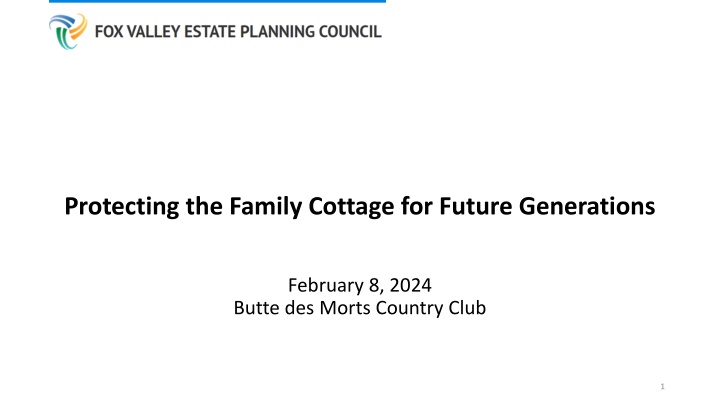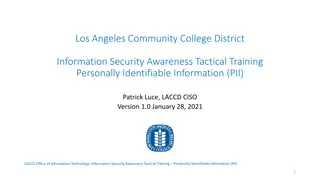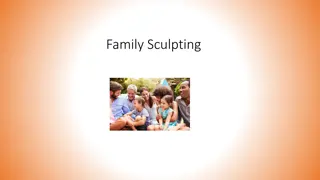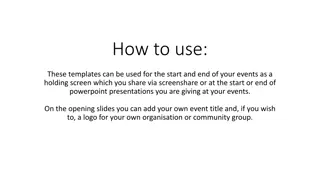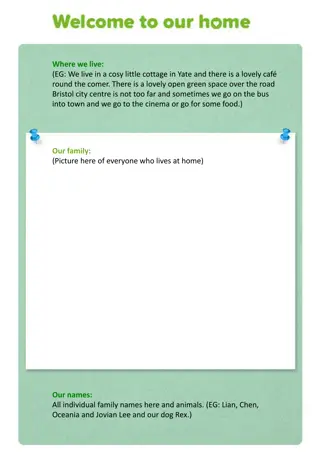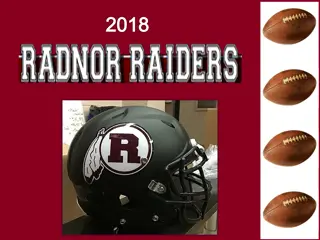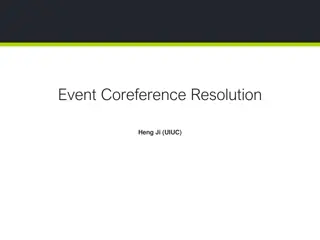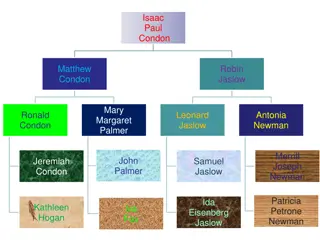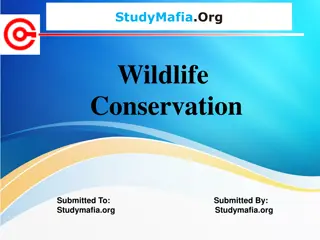Protecting the Family Cottage for Future Generations - Event Highlights
Explore key insights from the event held on February 8, 2024, at Butte des Morts Country Club focusing on legal, tax, operational, and emotional aspects of maintaining family properties like lake homes, hunting lands, and vacation properties. Discover why it's essential to establish and protect family properties for future generations, consider ownership structures, and understand the legal and tax implications involved.
Download Presentation

Please find below an Image/Link to download the presentation.
The content on the website is provided AS IS for your information and personal use only. It may not be sold, licensed, or shared on other websites without obtaining consent from the author.If you encounter any issues during the download, it is possible that the publisher has removed the file from their server.
You are allowed to download the files provided on this website for personal or commercial use, subject to the condition that they are used lawfully. All files are the property of their respective owners.
The content on the website is provided AS IS for your information and personal use only. It may not be sold, licensed, or shared on other websites without obtaining consent from the author.
E N D
Presentation Transcript
Protecting the Family Cottage for Future Generations February 8, 2024 Butte des Morts Country Club 1
Presenter Panel and Introductions James Phelan Remley Law, S.C. Matthew Borkovec Remley Law, S.C. Brian Wallace Nicolet National Bank & Member of a Family Cottage Julie Kiley - CliftonLarsonAllen LLP (CLA) Keith Depies Hawkins Ash CPAs LLP 2
Objectives Provide an open dialogue identifying issues in operating a family property Legally Taxation Operationally Emotionally Financially 3
What types of property are considered? Lake Home and Cottages Hunting Land Investment Property Out of State Vacation Property Timeshares Ski cabin 4
Why do this? Property held in family many years Legacy property Economy of scale/Share expenses Enjoy using the property occasionally and would not use enough on own New property and want to keep in the family 6
Who will own and use the property? Mom and Dad Children and Grandchildren Spouses In-laws Friends and Distant Relatives Outside Parties 7
Legal and Tax Considerations How is the property held? Partnership or LLC Corporation Trust Tenants in Common 8
Legal and Tax Considerations, continued When to establish the family property? When parents are alive and still using the property When parents are alive and not using the property Parents can t afford to maintain or upkeep anymore After the first of parents passes away When both parents pass Initial purchase of property After property held for a while After a dispute 9
Financial Considerations Annual Expenses how will these be paid and by whom? Funding Initial Contribution Annually Mortgage Real Estate Taxes Utilities Special Assessments Repairs and Upkeep Major Improvements or Acquisition of Adjacent Properties 10
The Family Agreements Initial cash contribution to operate Annual assessments, how determined and when due Allocation of use Who takes care of maintenance and repairs? Spring and Fall activities Periodic meeting of members What personal property belongs to the LLC (boats, ATV, furniture, etc.) How to handle death and or divorce How to get out of the arrangement at a fair price Any restrictions on family members wanting to get in or out 11
Sample Cottage Use Policies 1.Cottage is to be used by family members only. Any use of the cottage by family other than owners (grandchildren for example) must be arranged through an owner (parents). Owners should add to the google calendar, the names of family members using the cottage throughout the year. Friends are welcome to join family member during their stay. 2.Owners are welcome to switch weeks with another owner during the year. It would be preferable if there was an exchange of weeks between owners if possible. 3.Only pets belonging to family members may come to the cottage. Only house broken pets are welcome. Pet owners are expected to clean up the yard and cottage after their pets. 4.Bed sheets are to be cleaned and beds made after each family visit. A cleaning person may be hired if preferred, for post visit cleaning. 5.There will be designated shelves in the basement for each family to store non-perishable food items (or other things) such as beer, soda, water. The refrigerator and freezer upstairs and in the basement should be emptied of all food items except condiments after each family visit. 6.The power boat is to be driven only by family members who have been trained in boat safety and proper handling of the power boat. There are separate instructions (written by Brian) for use of the boats posted at the cottage. 7.The general rule is that is something gets broken during a family visit, then that family is responsible for the cost of the repair. The property managers (Brian and Dave) should be alerted to any significant damage that occurs during a family stay. 8.There is a Cottage Check-Out binder located in the cottage which will act as a reminder of everything the tasks that are to be done prior to leaving the cottage after a visit. The check-out sheet should be filled in, signed and dated upon leaving the cottage 12
Cottage Check-Out List ____ Lock the paddle boat to the dock ____ Crank down the deck table umbrella Name:__________________________________________ ____ All toys, lifejackets, water toys, returned to proper place in cottage. Clean up everything in the yard and on the deck Date: ___________________________________________ ____ Close all windows and lower/close all shades/curtains ____ Remove and discard or take with you: all food and beverages from both refrigerators, including the freezers, except for condiments that are still usable by future cottage users ____ In winter, adjust both thermostats to 50 degrees ____ In summer, turn off AC on both thermostats ____ Take any items from the pantry and bread drawer that you brought except canned goods or items that future users have expressed an interest in having ____ Adjust temp on water heater to vacation setting ____ Turn off all ceiling fans ____ Check to make sure oven and all stove burners are off ____ store any non-perishable items that you wish to keep at the cottage, on the basement shelf marked with your family name, such as soda, water, beer etc ____ Make sure all 4 exterior doors are locked ____ Leave dusk to dawn post yard lights on. Switch for driveway ____ empty all waste baskets and recycling containers. Roll the garbage and recycling refuse containers to the end of the driveway yard light is located next to basement light switch by the main door. The yard light down by the beach does not have a switch and is always active. ____ Leave bathroom doors propped open ____ Make sure no laundry is left in the washer. If clothes are left in the dryer, be sure they will be completely dried once the dryer cycle is finished ____ Both speed boat and fishing boat stored under canopy and raised on lifts so that the engine and propeller are completely out of the water.. Turn battery switch of speed boat to OFF. Make sure anything you used in either boat is removed from the boat and returned to proper place inside the cottage (life jackets, towels, trolling motor, beverage cans, sunscreen, gas container etc) ____ Dishwasher should be done running prior to leaving cottage. (To avoid a water disaster should the dishwasher fail). 13
Tax Considerations What is the basis in the property Sales of interest or property Rental management Annual Tax Reporting Federal States considering home state and out of state issues Estate and Gift considerations and concerns 14
Other Items to Consider What type of annual accounting will be done? Family Dynamics Will the property be rented to outside parties? VRBO, AirBNB Past Transfer Issues was it held in a QPRT, other trust, or LLC Annual legal state and local filing requirements FINCen regulations and new Corporate Transparency Act regulations How will disputes be mediated Are pets allowed Are you allowed to smoke on the property, fireworks Drinking while using personal property such as a boat or UTV Sweat equity Any limitations on personal items, art, etc 15
Sample Language on Use of Property and Arbitration Operating Agreement Section 4.1. Cottage Use by Members Scheduling the use of the cottage, which is the principal asset of the Company, shall be initially under the control of the life tenants of such property, that being ________________, or the survivor. ________________, for the reminder of their lives or so long as they are willing and able, shall provide the guidance as to the scheduling the use of the cottage and its care and maintenance. In the event of the death or disability of both ______________, or in the event of their unwillingness to act, the Manager shall be immediately responsible for the duty o f the scheduling the use and maintenance of such cottage. The Manager shall attempt to allocate the use of such cottage so as to be fair and proportional as to each Member s proportionate interest. Use shall be allocated as to the weeks and weekends which such cottage can be reasonably used for recreational purposes. Member s use of the cottage shall be restricted to that Member s spouse and the children of that Member and the spouse of any child or any grandchild, or such grandchild s spouse. 17
Limited Liability Partnership Agreement Scheduling Property Usage. The vacation use of the cottage property shall be scheduled during the twenty (20) weeks of summer. Vacation weeks begin at 6:00 p.m. on Friday and end at 4:00 p.m. on the following Friday. The first scheduled week shall be the fourth Friday in May, and beginning as follows for 2009: Week 1 May 22 Week 2 May 29 Week 3 June 5 Week 4 June 12 Week 5 June 19 Week 6 June 26 Week 7 July 3 Week 8 July 10 Week 9 July 17 Week 10 July 24 Week 11 July 31 Week 12 August 7 Week 13 August 14 Week 14 August 21 Week 15 August 28 Week 16 Sept 4 Week 17 Sept 11 Week 18 Sept 18 Week 19 Sept 25 Week 20 October 2 Vacation weeks beginning in 2009 would following the following schedule: __________ and his/her family will have weeks 1, 6, 11 and 16. __________ and his/her family will have weeks 2, 7, 12 and 17. __________ and his/her family will have weeks 3, 8, 13 and 18. __________ and his/her family will have weeks 4, 9, 14 and 19. __________ and his/her family will have weeks 5, 10, 15, and 20. The rotating schedule of weeks would then in 2010 allow ___________ and his/her family to move up to weeks 1, 6, 11 and 16, Tom to 3, 8, 13 and 18, etc. and _____________ his/her family shall revert to weeks 5, 10, 15 and 20 and so on each year thereafter. The open days of Memorial Day, the Fourth of July, and Labor Day will always be open for use to all family members. The Saturday/Sunday before Memorial Day and before Labor Day and the 3rd or 5th of July shall also be open days for use by all Partners. If these open days fall within a Partner s week, the family must plan accordingly. 18
Limited Liability Partnership Agreement, continued ________________ shall have the overriding authority for use of the cottage for the remainder of his/her life or as long as he/she is willing and able to provide guidance as to scheduling. He/she shall always be welcome at the cottage during any family s scheduled week. If any day of desired use by ________________ falls within a Partner s week, the family must plan accordingly. Any Partner may trade their family s week with any other Partner; however, all Partners may only reserve a maximum of four (4) weeks. Therefore, if one Partner (family) trades one week, they must give up one week. Weeks outside the summer weeks shall be open to all Partners. Use of these weeks shall be scheduled by the Scheduling Officer. Any weeks offered by a Partner for use shall be open to use by any other Partner as determined by the Scheduling Officer. The Scheduling Officer may develop a website to facilitate the cottage use. 19
Limited Liability Partnership Section 22. Mediation/Arbitration Any disputes arising out of the terms of this Agreement, or the exercise of the options granted herein shall first be resolved through use of a mediator scheduled through a local Conflict Resolution Center, Community Mediation Service, or with a mediator agreed to by all parties involved in such dispute. Such resolution through the mediation process shall be reduced to writing and signed by all parties and shall then be binding upon the parties to such resolution. In the event such dispute is not resolved through the mediation process, such dispute shall then be submitted to binding arbitration, pursuant to the Arbitration Rules under the Wisconsin State Statutes, prior to resorting to legal action. The decision of any arbitrator shall be final and may be entered into judgment in any court of law. 20
